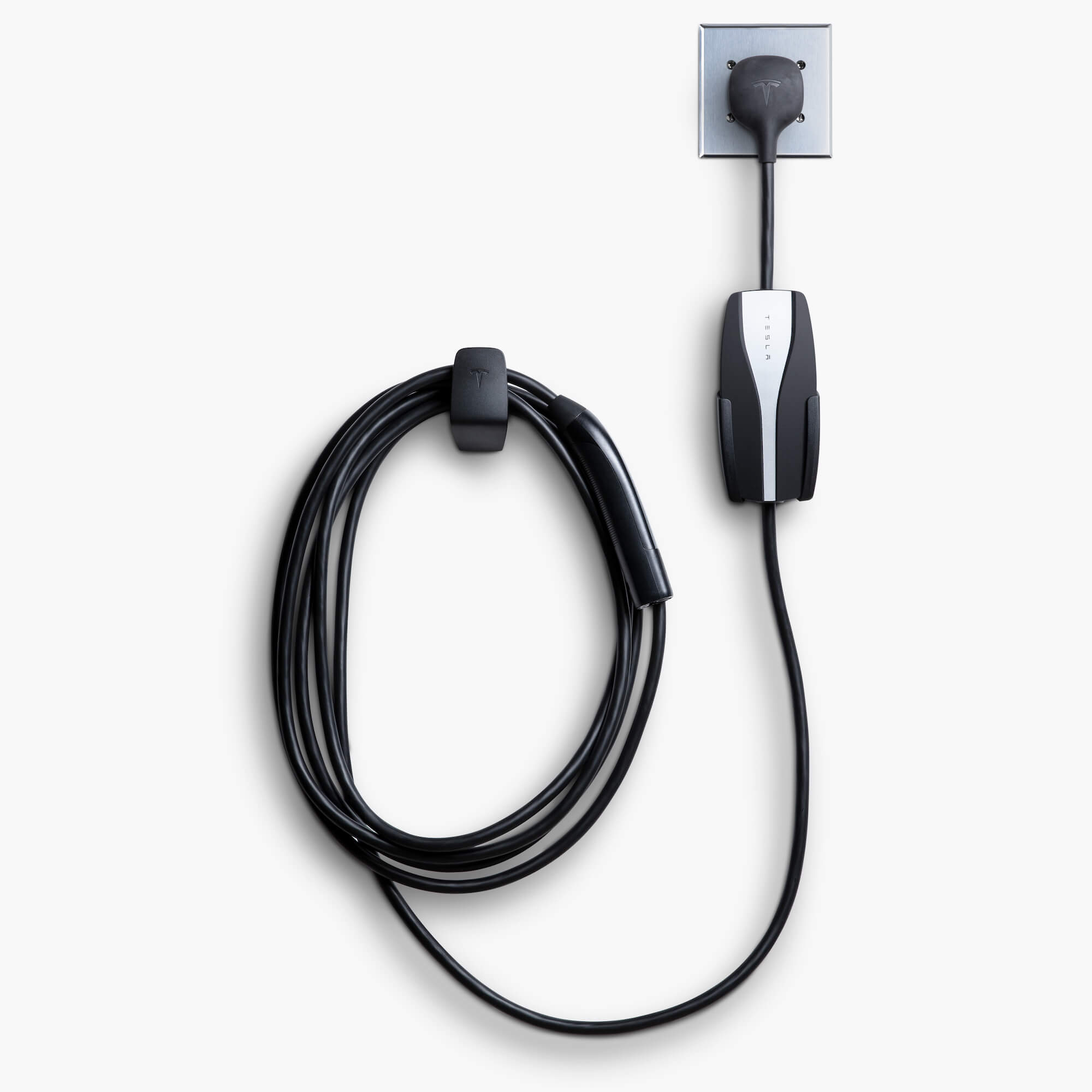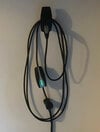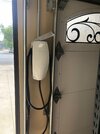Welcome to Tesla Motors Club
Discuss Tesla's Model S, Model 3, Model X, Model Y, Cybertruck, Roadster and More.
Register
Install the app
How to install the app on iOS
You can install our site as a web app on your iOS device by utilizing the Add to Home Screen feature in Safari. Please see this thread for more details on this.
Note: This feature may not be available in some browsers.
-
Want to remove ads? Register an account and login to see fewer ads, and become a Supporting Member to remove almost all ads.
You are using an out of date browser. It may not display this or other websites correctly.
You should upgrade or use an alternative browser.
You should upgrade or use an alternative browser.
Should I install NEMA 14-30 or 14-50?
- Thread starter acatwith12
- Start date
If you are going to install a 240V charging circuit in your home the best option for Level 2 charging for a Tesla vehicle is to install the Tesla Wall Connector. The cost, before any tax credit, is only ~$200 more than either the 14-30 or the 14-50 receptacle. The Wall Connector is compatible with any circuit from 15A up to 60A and can charge the Tesla Long Range Model Y or Performance Model Y at the maximum (48A) when used on a 60A circuit.Can't decide between installing a 14-30 or 14-50 in my garage as the permanent charger for my upcoming Y and looking for input.
There are several advantages to the Wall Connector:
No GFCI required for the circuit breaker
No neutral wire required, simpler wiring can save you money
Fully weather rated, can be installed in a garage or outdoors, charge all weather conditions.
Now comes with a 24 ft charging cord.
Supports load sharing if you ever need to charge a second EV.
Provides the fastest home charging: 40A on a 50A circuit, 48A on a 60A circuit. (The Tesla Mobile Connector that comes with the Tesla vehicle is limited to 32A when used on a 50A circuit.)
Last edited:
Some other considerations are
- Load: How much more can your panel / service support?
- Mileage: How much do you drive a day? 14-30 will add 21 miles per hour of charging. 14-50 will do 29.
- Federal tax credits (30% of your total cost up to $1,000 credit until end of 2021) reduce the cost of going with a more capable setup
- Do you want the mobile charger in your car? If I was buying another unit, I'd pay a little more for the HPWC vs a second mobile charger.
Load -> Panel is 100A and can't use dryer-oven-charging simultaneously but I only ever use one at a time, and can charge at night so doesn't matter.Some other considerations are
If the price difference between 14-30 and 14-50 isn't huge, I'd go with 14-50 just for the future-proof factor.
- Load: How much more can your panel / service support?
- Mileage: How much do you drive a day? 14-30 will add 21 miles per hour of charging. 14-50 will do 29.
- Federal tax credits (30% of your total cost up to $1,000 credit until end of 2021) reduce the cost of going with a more capable setup
- Do you want the mobile charger in your car? If I was buying another unit, I'd pay a little more for the HPWC vs a second mobile charger.
Mileage -> unsure due to COVID what it will be like post-COVID. Theoretically work is free charging there and only weekends will be driven, but no idea... I'm thinking that on weekends I could always SC near my place if I arrived home at low SOC, charge for a little, and do rest on 14-30 at home slowly overnight
Tax Credit -> I don't want to deal with it + pay the "Tesla tax" of installing an actual EV charger that everyone quotes me a ridiculous price ($1,600+ install vs ~$600 for an outlet - not sure how much the diff is between installing 14-30/50 though). I think I've pretty much decided on 14-30 or 50
Mobile charger - given my parents usage in previous year (used their car too) we've NEVER used mobile charger lol.... and don't travel much.
The cost would be about the same for the permit, GFCI circuit breaker, wire, outlet box and receptacle. The largest cost component is going to be the electrician's time, labor.
The 30A circuit requires 10 gauge wire minimum but you may want to install 8 gauge wire in case you ever upgrade your service and panel and want to change to a 40A circuit. If you decide to install a 50A circuit up front then the circuit would require 6 gauge wire, cost a bit more.
For 2021 you can claim the tax credit, 30% up to a maximum of $1000, on your federal income tax when you install a circuit for charging an EV. It can be a charging circuit with a receptacle, i.e. 14-30 or 14-50 if it is used for charging a plug-in vehicle.
About Form 8911, Alternative Fuel Vehicle Refueling Property Credit | Internal Revenue Service
The 30A circuit requires 10 gauge wire minimum but you may want to install 8 gauge wire in case you ever upgrade your service and panel and want to change to a 40A circuit. If you decide to install a 50A circuit up front then the circuit would require 6 gauge wire, cost a bit more.
For 2021 you can claim the tax credit, 30% up to a maximum of $1000, on your federal income tax when you install a circuit for charging an EV. It can be a charging circuit with a receptacle, i.e. 14-30 or 14-50 if it is used for charging a plug-in vehicle.
About Form 8911, Alternative Fuel Vehicle Refueling Property Credit | Internal Revenue Service
Last edited:
Jimt29
2020 Tesla Model Y LR AWD, MSM/Black
I feed off the dryer outlet using 14-30. 50 foot extension cord was $180 plus the connector from Tesla -$30-$40. Had to drill a hole from the back of the garage to the laundry room and cut off surplus extention cord. Then I bought a cheap plastic hanger and done.
Attachments
These are examples of things you should not do when charging:I feed off the dryer outlet using 14-30. 50 foot extension cord was $180 plus the connector from Tesla -$30-$40. Had to drill a hole from the back of the garage to the laundry room and cut off surplus extention cord. Then I lurched a cheap plastic hanger and done.
Passing an extension cord through a wall penetration is a code violation
Tesla does not recommend using an extension cord when charging using the Tesla Mobile Connector
Unsupported Mobile Connector chassis (should be attached to a wall stud or wall using a bracket or other means)
You are of course free to disregard these and other safe charging practices and electrical code rules. Perhaps someone else reading this will make better decisions with home charging.
ATPMSD
Active Member
@acatwith12
You spent a small fortune on your car, why are you trying to save a couple of hunter dollars on the home charger? You should install the Tesla Wall Charger, which will work on any circuit from 15-AMPs all the up through 60-AMPs. All of the other options have trade-offs.
You spent a small fortune on your car, why are you trying to save a couple of hunter dollars on the home charger? You should install the Tesla Wall Charger, which will work on any circuit from 15-AMPs all the up through 60-AMPs. All of the other options have trade-offs.
I went with the wall connector.. not installed yet but I got a quote of $500 to install it right next to my subpanel. So, the total will be about $1k for the connector and install. I thought it worth the difference, if the install price was what you've been quoted I would likely think twice.. I went through the mental gymnastics of trying to run an extension cord 50' to the back of my garage to a NEMA 14-30 dryer outlet and for the reasons @jcanoe mentions above decided it wasn't worth the risks.
FYI, the tax credit applies to both equipment and installation. If you only get the 14-* outlet installed in your garage, it's still eligible for the credit.Tax Credit -> I don't want to deal with it + pay the "Tesla tax" of installing an actual EV charger that everyone quotes me a ridiculous price ($1,600+ install vs ~$600 for an outlet - not sure how much the diff is between installing 14-30/50 though). I think I've pretty much decided on 14-30 or 50
mrau
Authorized Driver
You may want to run the 6 gauge wire no matter which way you decide to go. Usually running the wire is the most labor intensive part. With the 6 gauge wire you can still use a 14-30 outlet with a 30 amp breaker in your panel. If you ever upgrade you panel to 200 amp you could easily upgrade your EV circuit to a 50 amp with just changing the breaker and the outlet (no need to run new wire).
With a 14-30 you can efficiently charge your car up overnight. It will add about 22 miles of range every hour.
With a 14-30 you can efficiently charge your car up overnight. It will add about 22 miles of range every hour.
You may want to run the 6 gauge wire no matter which way you decide to go. Usually running the wire is the most labor intensive part. With the 6 gauge wire you can still use a 14-30 outlet with a 30 amp breaker in your panel. If you ever upgrade you panel to 200 amp you could easily upgrade your EV circuit to a 50 amp with just changing the breaker and the outlet (no need to run new wire).
With a 14-30 you can efficiently charge your car up overnight. It will add about 22 miles of range every hour.
I think mrau summarized it - I just don’t think I need the charge rate of the wall connector. As I’ve never used the mobile connector either I though I could use that as the perm anent charging solution and be happy with it if it gets the job done. There’s no harm as long as I’m not using extension cord right? I’ve heard of people doing that. It stays plugged in all the time. Wall connector is a considerably higher cost because permitting and what not for something I don’t think I absolutely *need*@acatwith12
You spent a small fortune on your car, why are you trying to save a couple of hunter dollars on the home charger? You should install the Tesla Wall Charger, which will work on any circuit from 15-AMPs all the up through 60-AMPs. All of the other options have trade-offs.
ATPMSD
Active Member
@acatwith12
If you already have an outlet that is available and you plan to leave the Mobile Connector plugged in all of the time, then go for it! You can always expand later if need be. You should get a mounting system such as

 shop.tesla.com
shop.tesla.com
If you already have an outlet that is available and you plan to leave the Mobile Connector plugged in all of the time, then go for it! You can always expand later if need be. You should get a mounting system such as

Cable Organizer
Store your Corded Mobile Connector with the newly redesigned Cable Organizer. This product features a sturdy bracket to keep your cables neatly stowed and a chassis holder to reduce additional wear and tear on your adaptor and outlet. Includes: 1x cable organizer bracket 1x chassis holder 1x...
haha yes bought one already from abstract ocean@acatwith12
If you already have an outlet that is available and you plan to leave the Mobile Connector plugged in all of the time, then go for it! You can always expand later if need be. You should get a mounting system such as

Cable Organizer
Store your Corded Mobile Connector with the newly redesigned Cable Organizer. This product features a sturdy bracket to keep your cables neatly stowed and a chassis holder to reduce additional wear and tear on your adaptor and outlet. Includes: 1x cable organizer bracket 1x chassis holder 1x...shop.tesla.com
sleepydoc
Well-Known Member
If you have the outlet already then it's probably not an issue, but another consideration is any outlet in a garage or for an EV needs to be GFCI protected and a GFCI breaker costs $100-150. The wall charger has built in GFCI protection so you can avoid the added expense.@acatwith12
If you already have an outlet that is available and you plan to leave the Mobile Connector plugged in all of the time, then go for it! You can always expand later if need be. You should get a mounting system such as

Cable Organizer
Store your Corded Mobile Connector with the newly redesigned Cable Organizer. This product features a sturdy bracket to keep your cables neatly stowed and a chassis holder to reduce additional wear and tear on your adaptor and outlet. Includes: 1x cable organizer bracket 1x chassis holder 1x...shop.tesla.com
Wolfhausen
Member
I paid $500 for the wall connector and $510 to have it installed by a certified electrician using a 60A breaker and 6/3 romex (50' run). Don't cheap out on the charger install. I don't think a nema outlet would be much more economical, more versatile for sure, but that was not my need.
Now if anyone can tell me how to take advantage of the charger tax credit, I'd appreciate it. I can probably get a copy of the charger receipt, buy my electrician never gave me an invoice.
Now if anyone can tell me how to take advantage of the charger tax credit, I'd appreciate it. I can probably get a copy of the charger receipt, buy my electrician never gave me an invoice.
Attachments
That is true for any new EV charging circuit. The circuit must be dedicated for charging the EV or plug-in vehicle. If the circuit terminates in a receptacle then it needs to be protected with a GFCI (either a GFCI receptacle or a GFCI circuit breaker.) If the circuit is hard wired then a GFCI is not required. Note that the Tesla Wall Connector and Tesla Mobile Connector both have GFCI protection for plugging and unplugging the charging connector into the Tesla vehicle's charging port. The addition of a separate GFCI protects the user when plugging and unplugging the equipment from the outlet receptacle.If you have the outlet already then it's probably not an issue, but another consideration is any outlet in a garage or for an EV needs to be GFCI protected and a GFCI breaker costs $100-150. The wall charger has built in GFCI protection so you can avoid the added expense.
If your electrician used 6/3 NM-B wire (Romex) then it is rated for a maximum of 55 amps, should not be used with a 60 amp breaker/circuit. The circuit breaker should be changed to 50 amps if the circuit was wired using 6/3 Romex. Other types of 6 gauge wire, i.e. THHN, can be used with a 60 amp circuit.I paid $500 for the wall connector and $510 to have it installed by a certified electrician using a 60A breaker and 6/3 romex (50' run). Don't cheap out on the charger install. I don't think a nema outlet would be much more economical, more versatile for sure, but that was not my need.
Now if anyone can tell me how to take advantage of the charger tax credit, I'd appreciate it. I can probably get a copy of the charger receipt, buy my electrician never gave me an invoice.
About Form 8911, Alternative Fuel Vehicle Refueling Property Credit | Internal Revenue Service
You should save your receipts; the electrician who installed the circuit should provide you with an invoice.
ATPMSD
Active Member
for an EV needs to be GFCI protected and a GFCI breaker
Pretty sure this is not an “EV” requirement. GFCI’s are a requirement for potentially wet areas, such as the kitchen, garage, etc. But as noted they are not required when hardwired.
Similar threads
- Replies
- 17
- Views
- 603
- Question
- Replies
- 30
- Views
- 2K
- Replies
- 9
- Views
- 475
- Replies
- 50
- Views
- 3K




